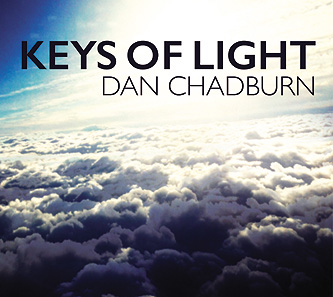 The
music of Dan Chadburn was featured on mwe3.com over the Christmas
2014 holidays with the CD release of Whispers The Falling Snow.
During the summer of 2015 Dan returned with Keys Of Light.
Wider in scope than Nocturnes (2012) and Whispers, the
12 tracks on Keys Of Light offers a range of instrumental piano
meditations on all things Keys and all things Light. The
title is kind of a play on the term key of life, although, clearly
without the shining of light nothing would progress on all levels
of life. Also of note, Dan has written 12 tracks that each go through
a different key change, going though a range of musical keys. And
the beautiful thing is that the listener is drawn in as each song
goes though its own key change. Speaking about the unique idea of
an instrumental, New Age / Neoclassical album that features piano
based instrumentals in twelve different musical keys, Dan notes, “I
truly believe every person has a unique gift to offer. So I arranged
each of the twelve pieces in a different musical key to symbolize
the many and varied opportunities we have to bring light to this world.”
Dan’s fifth album as a recording artist, Keys Of Light
still features his unique piano sound, this time mixed with other
classical instruments such as flute, horn, cello, as well as some
added synth effects for extra texture. In composing his latest music,
Dan uses his real life experiences to shine a light upon the often
sensitive aspects of the human experience adding, “Lives touch
lives. That is what living is all about. Light connotes living and
growing. Someone else’s light can be a positive force of an inspiration
for others.” Also key to the sound of Keys Of Light is
the tasteful co-production of Dan’s husband and musical partner
Tom Nichols, with Dan adding, "I've been so very fortunate
to work with Tom in music for the past twenty years or so now. Never
have I met anyone who has the depth and diversity of gifts and talents
he does. As an artist himself, he is an incredibly inspiring singer/songwriter…
his album, Trust is on constant play in my car. As a producer, he
has had an enormous impact on my work, as well as the work of other
artists lucky enough to have worked with him." Overall, the
mix of Dan’s piano with the added sonic backing gives Keys
Of Light a very neoclassical tone. Being the perfectionist that
Dan is, it is just a little surprising, (but in a pleasant way), to
see the album end with the song “Colour My World”, written
by James Pankow and which was a huge hit for the band Chicago in 1970.
Perfectly composed instrumental music with a definite reflective purpose,
Keys Of Light brings into focus the Neoclassical piano magic
of Dan Chadburn. www.DanChadburn.com
The
music of Dan Chadburn was featured on mwe3.com over the Christmas
2014 holidays with the CD release of Whispers The Falling Snow.
During the summer of 2015 Dan returned with Keys Of Light.
Wider in scope than Nocturnes (2012) and Whispers, the
12 tracks on Keys Of Light offers a range of instrumental piano
meditations on all things Keys and all things Light. The
title is kind of a play on the term key of life, although, clearly
without the shining of light nothing would progress on all levels
of life. Also of note, Dan has written 12 tracks that each go through
a different key change, going though a range of musical keys. And
the beautiful thing is that the listener is drawn in as each song
goes though its own key change. Speaking about the unique idea of
an instrumental, New Age / Neoclassical album that features piano
based instrumentals in twelve different musical keys, Dan notes, “I
truly believe every person has a unique gift to offer. So I arranged
each of the twelve pieces in a different musical key to symbolize
the many and varied opportunities we have to bring light to this world.”
Dan’s fifth album as a recording artist, Keys Of Light
still features his unique piano sound, this time mixed with other
classical instruments such as flute, horn, cello, as well as some
added synth effects for extra texture. In composing his latest music,
Dan uses his real life experiences to shine a light upon the often
sensitive aspects of the human experience adding, “Lives touch
lives. That is what living is all about. Light connotes living and
growing. Someone else’s light can be a positive force of an inspiration
for others.” Also key to the sound of Keys Of Light is
the tasteful co-production of Dan’s husband and musical partner
Tom Nichols, with Dan adding, "I've been so very fortunate
to work with Tom in music for the past twenty years or so now. Never
have I met anyone who has the depth and diversity of gifts and talents
he does. As an artist himself, he is an incredibly inspiring singer/songwriter…
his album, Trust is on constant play in my car. As a producer, he
has had an enormous impact on my work, as well as the work of other
artists lucky enough to have worked with him." Overall, the
mix of Dan’s piano with the added sonic backing gives Keys
Of Light a very neoclassical tone. Being the perfectionist that
Dan is, it is just a little surprising, (but in a pleasant way), to
see the album end with the song “Colour My World”, written
by James Pankow and which was a huge hit for the band Chicago in 1970.
Perfectly composed instrumental music with a definite reflective purpose,
Keys Of Light brings into focus the Neoclassical piano magic
of Dan Chadburn. www.DanChadburn.com
mwe3.com presents an interview
with
DAN CHADBURN
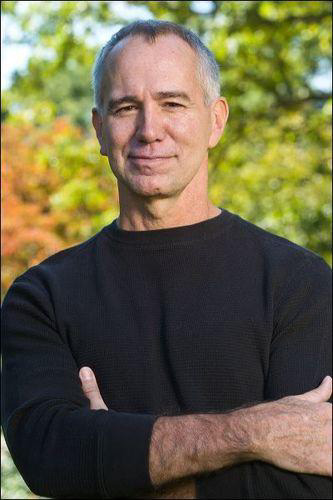 mwe3:
You have a great concept for your 2015 album Keys Of Light,
in that we live in the light, need the same light for everything including
growing our food, and we also use metaphorical individual keys for
our own world, not only the keys to our homes and cars, etc…
What made you think of the connection of keys and light and how did
you approach it and tie it into your new music?
mwe3:
You have a great concept for your 2015 album Keys Of Light,
in that we live in the light, need the same light for everything including
growing our food, and we also use metaphorical individual keys for
our own world, not only the keys to our homes and cars, etc…
What made you think of the connection of keys and light and how did
you approach it and tie it into your new music?
Dan Chadburn: First off, let me just say "thank you!"
to you, Robert, and all the folks at mwe3.com,
for the opportunity to talk about the new album, Keys Of Light.
I appreciate it very much!
The album's title, "Keys Of Light," came to us while my
husband, Tom Nichols and I were brainstorming one Saturday afternoon
with our close friends, Anne Madison and Dave Heneberry. I told them
each of the tracks on the album was purposefully composed in a different
key, symbolic of the unique opportunity we each have to bring light
to this world. I spoke of how the music was written to celebrate friendship
and how several of the tracks were composed and offered now as tributes
to honor those who have touched my life and the lives of others in
profound ways.
Asking me to pause, Anne suddenly said, "Why not call it 'Keys
Of Light?'"
We immediately recognized the obvious connections: from the musical
keys of each song to the physical keys or notes on a piano, as well
as the "more metaphorical" unlocking of feelings, memories,
and emotions.
The images of light you mention are some of the same examples we discussed,
some direct connections, and some more subtle.
Inspiring. Encouraging. Empowering. Liberating.
mwe3: How did you decide on the musicians you chose to support
you and can you tell us who is playing with you on the Keys Of
Light CD? What kind of sound were you going for? Clearly, Keys
CD has a kind of neoclassical aura to it.
Dan Chadburn: I definitely wanted Keys Of Light to encompass
a more orchestral, rich aural landscape than my earlier recordings.
Aside from the three solo piano pieces on the album, I scored the
music for piano and traditional string instruments (cello, viola,
and violin), brass (trumpet and french horn), and woodwinds (flute
and english horn). I also needed the flexibility of utilizing the
sound of sectional strings at times - a section of 8 cellos and 10
violas in "To The Heavens" for instance, as well as solo
string instruments, for example, the single violin in "Tyler's
Tribute".
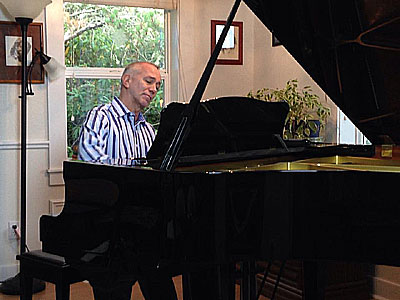 We
considered hiring live players to record the parts, as we have done
in the past, but quickly realized to do so, with so many players,
would have broken our budget for the project many times over. So,
instead, we began experimenting with different orchestral digital
sound libraries to see how best to re-create an authentic acoustic
sound.
We
considered hiring live players to record the parts, as we have done
in the past, but quickly realized to do so, with so many players,
would have broken our budget for the project many times over. So,
instead, we began experimenting with different orchestral digital
sound libraries to see how best to re-create an authentic acoustic
sound.
We eventually decided upon East West's "Symphonic Orchestra."
I played and recorded each of the orchestral parts, as midi data,
into ProTools, using the Kurzweil PC3K8 as the controller. Symphonic
Orchestra was then used in playback to record each of the instrument's
musical lines. We were also able to play with some articulations and
effects, creating tonal variations on some of the instruments and
their respective parts.
As much as I love working with live players, this ultimately was the
most practical way for us to record Keys Of Light.
mwe3: What piano did you use on the Keys Of Light
album and what kind of mic’ing techniques did you use to capture
your full piano range? Are there any new developments in the piano
and keyboard world for you these days? So many artists say that Steinway
is the way to go, what do you say about that and how about apps? The
world is obsessed with apps for everything these days!
Dan Chadburn: We used both a 7' Yamaha and the Kurzweil PC3K8
on Keys Of Light. For mic'ing the Yamaha, our engineer, Jim
Robeson (www.jimrobesonproductions.com),
used two Neumann U87s (vintage), about 12" above the hammers,
approximately 18" apart (off-axis). Mic-preamps were API.
I know many artists who prefer Steinway over any other piano. Indeed,
Steinway does make amazing pianos. I happen to love Yamaha. The first
piano I ever owned was a Yamaha and I've been happy with them ever
since.
You asked about apps. I have to admit, I know very little about apps
for music: what's available, what's popular, etc. Your question peaked
my curiosity, however, so I just did a quick search of "piano"
at Apple's app store. There is certainly no shortage of piano-based
apps! It may be time I get educated and try some of these out!
mwe3: Tell us about working through the years with Tom Nichols
on your music and now on Keys Of Light and how yours and Tom’s
musical vision and chemistry affects the music and the end results.
What is Tom’s forte so to speak as a musician / producer? Have
you and Tom done shows together?
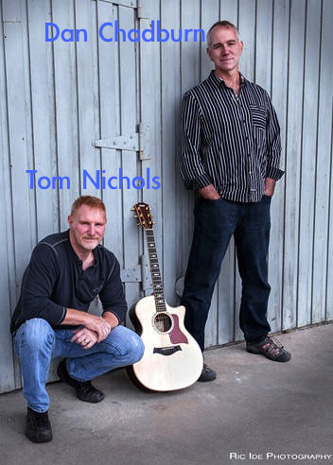 Dan
Chadburn: Tom and I perform together as much as we can, often
as fundraisers for various non-profits. We both love animals so it's
been a pleasure over the past few years to give benefit concerts for
local animal shelters, including the Florence Area Humane Society
in Oregon this past August. Earlier in the summer, we did a show in
Greenwich Village in New York at a local Lutheran church to benefit
LGBT homeless youth. We also enjoy hosting concerts in our home here
in Virginia, both as performers and promoting other musicians who
either live, or are touring, in our area.
Dan
Chadburn: Tom and I perform together as much as we can, often
as fundraisers for various non-profits. We both love animals so it's
been a pleasure over the past few years to give benefit concerts for
local animal shelters, including the Florence Area Humane Society
in Oregon this past August. Earlier in the summer, we did a show in
Greenwich Village in New York at a local Lutheran church to benefit
LGBT homeless youth. We also enjoy hosting concerts in our home here
in Virginia, both as performers and promoting other musicians who
either live, or are touring, in our area.
I've been so very fortunate to work with Tom in music for the past
twenty years or so now. Never have I met anyone who has the depth
and diversity of gifts and talents he does. As an artist himself,
he is an incredibly, inspiring singer/songwriter… his album,
Trust is on constant play in my car. As a producer, he has
had an enormous impact on my work, as well as the work of other artists
lucky enough to have worked with him.
A year prior to recording my first CD, Solo Piano, in 1998,
I composed and recorded some 300 piano improvisations into my computer.
Narrowing these down to 100 or so, Tom took the time to listen objectively
to each and every improv, essentially rating each one's viability
for placement onto the Solo Piano CD. Without him undertaking
this tedious task, helping me to narrow these 100 possibilities down
to a dozen or so tracks for the album, I doubt Solo Piano would
have ever been recorded and released. He believed in me and in the
project. That meant the world to me.
Tom is a "key of light." As a producer, he knows how to
unlock my creative spirit, helping me channel the gift that is music.
As an artist, he understands how doubts can sometimes interfere with
the process. Never one to dwell on the negative, his own confidence
and desire to make this a better world is an inspiration to everyone
he meets.
mwe3: The concept of using the 12 keys of music and applying
it to the 12 track Keys Of Light concept is interesting. Do
you find that some tracks work better in different keys or did it
just turn out like that?
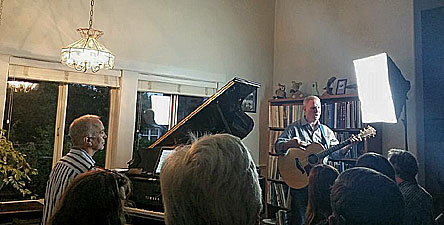 Dan Chadburn:
Before I selected the specific pieces for the album, I decided I wanted
each track to be in its own key, symbolic of how we, as individuals,
each offer something unique and special to this world. Collectively,
these "keys" offer a diversity.
Dan Chadburn:
Before I selected the specific pieces for the album, I decided I wanted
each track to be in its own key, symbolic of how we, as individuals,
each offer something unique and special to this world. Collectively,
these "keys" offer a diversity.
Several of the pieces, and the unique keys in which they were composed,
were preselected for the album, due to their dedications. These included
"Matthew" (d minor to D Major), "Paul's Prayer"
(Bb Major), "With You Always" (A Major), "Tacoma Morning"
(e minor to E Major), "Tyler's Tribute" (c minor to C Major
to c minor), "Diamond In The Sky" (Ab Major), and "Chesapeake
Sail" (f# minor).
With five tracks still open, I selected the title track, "Keys
Of Light" (Gb Major) as well as two pieces from my library which
I felt would contrast nicely with the others: "Beyond The Rain"
(a minor), and "To The Heavens" (eb minor).
The remaining two tracks, both solo piano tracks, were then recorded
in the studio to complete the album: "Colour My World" (F
Major), as an arrangement on the classic cover, and "My Irish
Love" (Db Major), a one-take improvisation dedicated to Tom.
The key of Db Major was chosen because 1) it was still available and
2) it has a warm and rich resonance in the piano's lower register.
mwe3: Are some keys harder to play in than others? Everyone
knows like the key of C or G are easier (not too many black keys)
compared to E flat, or G flat, at least for guitarists! Do you prefer
major or minor keys or does it really depend on the track? Can you
give an example on Keys Of Light where a certain key signature
reinforced the aura or feel of the track? I was thinking of the title
track “Keys Of Light” where you chose to play it in Gb major.
How do you decide on the key signature of a track?
 Dan Chadburn:
First of all, as one who wishes he could play guitar, every
key on guitar for me is hard, including C and G! (lol) I look
at all those frets, trying to guess which string to press, which finger
to use, and I get totally confused. And that's for only one
of my hands!
Dan Chadburn:
First of all, as one who wishes he could play guitar, every
key on guitar for me is hard, including C and G! (lol) I look
at all those frets, trying to guess which string to press, which finger
to use, and I get totally confused. And that's for only one
of my hands!
Guitarists have my total respect!!
Now, a quick word of explanation... As I reference a "key"
or "keys" here, I'm referring to a "key signature"
or signatures - rather than a single key you would press to play on
a piano.
As far as playing in different keys on the piano, it can certainly
be a challenge for pianists. When I first started piano lessons as
a kid, I was very lucky to have had a teacher (Maxine Martin) who
stressed the importance of learning scales in every key, both major
and minor, as well as chord progressions. She also had me play from
J.S. Bach's "Das Wohltemperierte Klavier" (a/k/a "The
Well-Tempered Clavier"), a collection of 24 preludes and fugues
covering all 24 major and minor keys. With that technical combination
of scales and Bach, and after a fair amount of practice, I eventually
became completely comfortable playing in any key.
Now, do all keys feel the same as they "sit in the hand?"
No. Every key has its own distinct tactile sense. Do different keys
produce the same tonal resonance when played, albeit on different,
but relative, pitches? Definitely not.
You hinted at this in your question about "Keys Of Light"
(Gb Major). If "Keys Of Light" was instead, composed downward
in C Major, the greatest possible distance away from Gb Major, it
would have a very different resonance in its tone. Additionally, the
color produced by the orchestral instruments would be much darker
and less buoyant.
By composing it in Gb Major, the tones in the piano have a certain
shimmering quality as the piece begins. Then, as each of the other
instruments enter, the single voice that began in the treble of the
piano gradually transforms into a rich texture of sound, with each
instrument singing in polyphony and sharing in the luminance of the
whole.
It doesn't apply in this instance, but occasionally I might begin
composing a piece in one key and then later decide it's necessary
to transpose the piece up or down. This will occur if I've added an
instrument to the score that would be out of range to play a specific
note or musical line if the piece was left in its original key.
mwe3: You seem to be very heartfelt in your approach on Keys
Of Light. Do you find that to be true and in what ways does music
reflect your emotions or feelings? I was thinking of “Tyler’s
Tribute” and how the minor key brings out your emotions regarding
that young man’s tragic demise. Interesting how the track goes
from C minor to C major and then back to the minor key again.
 Dan Chadburn:
The Keys Of Light project is definitely more personal to me
than any other I've ever done. Early on, I realized it needed to be
an album of expression and emotion more than statement or form.
Dan Chadburn:
The Keys Of Light project is definitely more personal to me
than any other I've ever done. Early on, I realized it needed to be
an album of expression and emotion more than statement or form.
You mentioned "Tyler's Tribute." Tyler Clementi was a gifted
violinist and student who began his freshman year at Rutgers University
in September, 2010. Just three weeks into the fall semester, Tyler
became distraught and jumped to his death off the George Washington
Bridge, after learning his roommate had secretly filmed and broadcast
him kissing another guy. I composed "Tyler's Tribute" a
few days after his death, in his memory, to honor him and all others
who have been victims of sexual and cyber bullying.
"Tyler's Tribute" is one piece of music I wish I had had
no reason to write.
There's a tab on my website (www.DanChadburn.com/keys-of-light)
which details the background and dedication for each of the other
tracks on Keys Of Light.
mwe3: Even in a world of so many gifted artists, you have
managed to create a unique sound that combines New Age and soundtrack
piano arrangements. In my opinion, your music kind of cries out to
play at Carnegie Hall! Are things underway to bring more attention
to you and other gifted 21st century artists? If New Age and Healing
/ Meditation music is the classical music of the 21st century than
why isn’t there more attention being paid to artists such as
yourself?
Dan Chadburn: Thank you for your kind opinion about my music
and playing at Carnegie Hall. I appreciate that very much.
In the last few years, the availability of original music on the internet,
in all genres, has multiplied many times over. It's simply so much
easier for someone to record an album today and release it online,
all from his/her living room, than it was yesterday to record an album
old-school, in a professional studio, then attempting to find a distributor,
hoping the album gets traction.
Some genres are, and always have been, more conducive to live performance.
And obviously, with an artist's performance comes increased visibility
and attention. Fortunately, within the New Age genre, there are established
networks of talented artists/composers whose music is streamed regularly
online. These networks also provide artists the opportunity to schedule
concert appearances with one another, as well as a forum in which
artists can support one another while discussing music industry-related
matters.
 mwe3:
How about other ways to get heard, say for instance on NPR? Do you
get enough exposure on things like NPR? Radio is so obsessed with
news, most of it bad these days. Are certain radio outlets more friendly
to your music? What are some of your favorite radio stations and even
mags and web zines in the U.S. and the world for that matter?
mwe3:
How about other ways to get heard, say for instance on NPR? Do you
get enough exposure on things like NPR? Radio is so obsessed with
news, most of it bad these days. Are certain radio outlets more friendly
to your music? What are some of your favorite radio stations and even
mags and web zines in the U.S. and the world for that matter?
Dan Chadburn: Well, let me just start with the obvious: mwe3.com
is among my favorite web zines! Your website offers so many cool features
and reviews across a wide spectrum of musical genres/styles. I literally
could spend a year at your site and still not have had time to read
everything. Excellent!
You asked about NPR. I have to admit I've never been in contact with
NPR about getting my music placed with them. Elsewhere, I get frequent
requests for the use of specific tracks off my albums and generally
speaking, I don't hesitate to say yes. As I see it, music is a gift…
receive it, honor it, and then share it.
I agree... the world could use more music and a lot less bad news.
Fortunately, there are many New Age/neoclassical radio stations whose
purpose or mission is to foster calm and peace in this otherwise crazy
world. I'm grateful to have had my music featured on these stations
alongside that of so many wonderful artists. I could list the individual
stations here, but no doubt I would carelessly forget at least one.
Each of them is important for what they do and offer the listeners.
 mwe3:
I was interested to know how you decided to choose to cover the song
“Colour My World”, the Chicago song from 1970, which ends
the Keys Of Light album. It’s such a classic, yet often
overlooked track and it works great as an instrumental. I know you
said you were a fan of Chicago’s music. Is that an avenue you
would consider pursuing more as well, reconstructing classic rock
cover songs as instrumental piano... songs you might not hear everyday
anymore? Is the rock music of the ‘70s the classical music of
the future?
mwe3:
I was interested to know how you decided to choose to cover the song
“Colour My World”, the Chicago song from 1970, which ends
the Keys Of Light album. It’s such a classic, yet often
overlooked track and it works great as an instrumental. I know you
said you were a fan of Chicago’s music. Is that an avenue you
would consider pursuing more as well, reconstructing classic rock
cover songs as instrumental piano... songs you might not hear everyday
anymore? Is the rock music of the ‘70s the classical music of
the future?
Dan Chadburn: Many of the '70s rock classics have such great
melodies and interesting chord progressions, making them very adaptable
to piano instrumentals today. "Colour My World" was one
of my favorite Chicago songs as a kid. I loved the open sound of the
major 7ths and 9ths, and the quirkiness, or unpredictability, of its
chord progression, always moving forward with the steady, quiet pulse
of its 12/8 meter.
When Tom and I decided to close the Keys Of Light album with
a cover, "Colour My World" kept calling to us with its strong,
yet simple, statement of love and light. And so, on the last day of
recording, I sat down at the piano, closed my eyes, and improvised
upon that popular song of my youth.
mwe3: How about soundtracks and how they influence your music?
The music on Keys Of Light is both symphonic sounding in places
as well as soundtrack influenced. Also soundtracks, in some ways,
sort of took the place of the symphonic music in the recent past wouldn’t
you say? Just look at the 2001 soundtrack for example. How about favorite
movies and movie soundtracks that might have influenced you? Has your
current music been used in movies or documentaries and is that something
you’d like to pursue more?
 Dan
Chadburn: Like most, I've watched and enjoyed movies my entire
life, across a wide spectrum of genres. And many times it's the soundtrack
that draws me in.
Dan
Chadburn: Like most, I've watched and enjoyed movies my entire
life, across a wide spectrum of genres. And many times it's the soundtrack
that draws me in.
2001: A Space Odyssey is an excellent example of a film importing
classical music into its soundtrack; preexisting symphonic works by
Johann Strauss II, Aram Khachaturian, Richard Strauss, and Gyorgy
Ligeti seamlessly accompany the film's futuristic story line.
"Platoon" brilliantly juxtaposes Samuel Barber's gorgeous
"Adagio For Strings" against the hellish images of death
and modern war.
John Williams' scores, whether it be from such blockbusters as Jaws
or Star Wars, or powerful stories like Schindler's List
or Born On the Fourth Of July are, in my opinion, symphonic
masterpieces.
Scoring for film is an entirely different craft, and process, than
composing. Composing essentially has no external boundaries. If I
want to sit down and write a piano concerto, I can take it at any
tempo, put it in any key, score it to any length. If I want to add
a crazy electric guitar riff right in the middle to blast out the
piano's lyrical theme? No problem. There are no external parameters.
In film scoring, however, not only must the composer write, and often
orchestrate the music, it must be written so as to coexist with dialogue,
while also serving to suggest, or explain, or foreshadow, or accentuate,
or transport, or…, the imagery/action on screen. And... timing
is everything.
While I'm not now actively pursuing film scoring, I applaud those
who are, for it takes a special kind of musical talent and ability.
Bravo to those who do it well!
 mwe3:
You must be very happy about the way your past few albums have been
received by your audience. Are you also planning new music and other
projects into 2016 already...
mwe3:
You must be very happy about the way your past few albums have been
received by your audience. Are you also planning new music and other
projects into 2016 already...
Dan Chadburn: I'm happy and thankful for every day I'm able
to write and share music. To know that others are listening and experiencing
an emotional connection to the music is incredible. For me, that's
what it's all about.
As far as 2016, I'm currently in preproduction for my next album,
which at this time is slated to be solo piano. Aside from my recent
holiday release Whispers The Falling Snow, I haven't released
a solo piano recording since my first album Solo Piano in 1998.
This gives me the opportunity to feature an instrument I love, placing
the entire dynamic and melodic range of a piano's 88-notes onto a
single, but multidimensional, canvas. I anticipate its release will
be next Spring.
I want to say thank you again, Robert, for extending the invitation
to talk with you and the readers at mwe3.com
about Keys Of Light. I appreciate it very much! Peace!
Thanks
to Dan Chadburn @ DanChadburn.com



